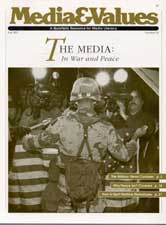Military Doublespeak: How Jargon Turns Gore into Glory
|
Adapted with permission from Media and the Gulf War: A Case Study by the Association for Media Literacy, Ontario, Canada This article originally appeared in Issue# 56
|
"Doublespeak is not lying, nor is it merely sloppy language. It is the intentional use of euphemisms, synonyms, jargon, and vagueness which pretends to communicate but really does not, or implies the opposite of what it would appear to communicate." --- Metta Winter, Christian Science Monitor
For centuries before George Orwell coined the word "doublespeak" to convey the flavor of government-sponsored linguistic deception, soldiers have used language to mask the horror of war.
Military jargon has always specialized in turning gore into glory. Many modern conflicts have also focused on sports metaphors that, as many critics have noted, trivialize war. The Gulf War provided "superb examples of doublespeak that managed to turn carnage into something cold and drained of emotion," comments The Media and the Gulf War: A Case Study published by the Association for Media Literacy in Toronto." Many magazines and newspapers "translated" selected collections for their readers.
The following list can be used to start your own war jargon collection. Building and posting a class list is an excellent way to help young people tune in to news reports of any military conflict. Have students find examples of the use of jargon. Try rewriting stories without jargon to see what's really going on and how euphemisms on any topic can distort and mislead.
|
surgical strike = |
precision bombing |
|
laying down a carpet = |
saturation bombing |
|
denying the enemy = |
bombing military targets in the hearts of cities |
|
assets = |
bombs |
|
collateral bombing = |
civilian deaths during bombing raids |
|
incontinent ordnance = |
mistaken shelling of one's own troops |
|
assertive disarmament = |
destruction of the enemy's fire power |
Adapted with permission from Media and the Gulf War: A Case Study by the Association for Media Literacy, Ontario, Canada



